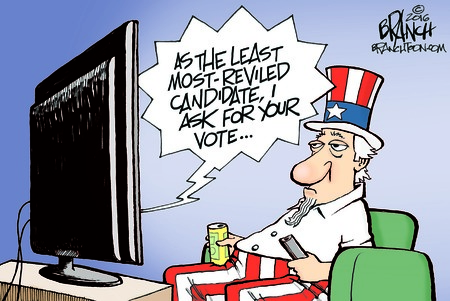
Is democracy at risk this election year?
Yup, is the answer given by President Joe Biden in his speech last Friday, ahead of the third anniversary of the Jan. 6, 2021, assault on the United States Capitol as both houses of Congress were assembled to receive the electoral votes for the November 2020 election.
He argues that if Donald Trump is elected to a second term next November, democracy will be uniquely imperiled. Casting doubt on that is the fact that the U.S. did not sink into dictatorship during the four years of Trump's presidency. I say that as one who wrote back then that Trump's words "were uttered with a reckless disregard for the possibility that they would provoke violence, which any reasonable person could find impeachable." But the rioters were dispersed, and the electoral votes counted.
Nor does the current president have an impeccable record. As the Wall Street Journal's Allysia Finley points out, he has acted in blatant disregard of constitutional limits on student loan cancellations, banning evictions, mandating COVID-19 vaccines and colluding with social media companies to suppress dissenting speech.
A strong case can be made that the administrations of both the current and former presidents, in important ways, transgressed constitutional limits and violated traditional norms. Which one was worse is subject to debate, but neither has ended democracy.
Trump has cynically denied that he lost the 2020 election and has bullied many Republicans into echoing his claims. Dozens of congressional Democrats voted to reject electoral votes cast for Republicans in the 2004 and 2016 elections, and few, if any, Democrats have confessed error about participating in the Russia collusion hoax, which was intended to delegitimize a legitimately elected president.
Actually, to say that electoral democracy is at risk seems overwrought in a year that, as The Economist notes, will be "the biggest election year in history." India and the United States, the world's two largest democracies, are holding general elections. Among populous nations, Bangladesh has already voted, Indonesia and Pakistan will soon, and Mexico, Russia and Britain will follow.
Altogether, elections will be held in 70-some nations with more than 4 billion people — a majority of the world's people. And if some of these elections are rigged or perfunctory — see Vladimir Putin's Russia — it is still notable that authoritarian rulers consider it worth the trouble to go through the motions of at least imitating electoral democracy.
Of course all is not well with the operation of electoral democracy, even where it has long been established, in the Anglosphere. Both of the two oldest political parties in the world — America's Democrats and Britain's Conservatives — are facing defeat.
Current polling shows Biden to be trailing Trump, and Democrats could lose their 51-49 Senate majority and fail to regain the House majority they narrowly lost in 2022. This wouldn't be the first setback the Democratic Party has suffered since it was founded in 1828 — 196 years ago! — to elect Andrew Jackson. But it's one it might have avoided if it does not renominate, as it seems certain to do, an 81-year-old incumbent vulnerable for sparking inflation and opening the southern border.
In Britain, the Conservative party, in 14 years with a majority in the House of Commons, has produced no fewer than five prime ministers — and policy fiascos that leave it far behind in the polls. But despite similar repudiations, it has been Britain's most winning party since it was founded by Benjamin Disraeli in 1846.
One problem these two parties have had recently is in selecting leaders capable of winning general elections and governing effectively once in office. Democratic and Republican national conventions go back to 1832 and 1856, but the parties' current processes of selection in combinations of primary elections and caucuses go back only to 1972.
The constant flux in primary scheduling and the continued prominence of certain states — I've never been able to find the provision in the Constitution that says Iowa and New Hampshire vote first — have left the presidential selection process as the weakest part of our political system.
This year, it has seemed to give voters little choice, with two nominees both careless of democratic norms. Biden has no effective competition for the Democratic nomination, and the series of mostly specious indictments of Trump, starting last March, have propelled him far ahead of his serious competitors, Ron DeSantis and Nikki Haley.
That doesn't leave democracy at deadly risk. But modern electoral democracy, in this year of a record number of elections, is not operating optimally in the nation where it started some two centuries ago.


 Contact The Editor
Contact The Editor
 Articles By This Author
Articles By This Author